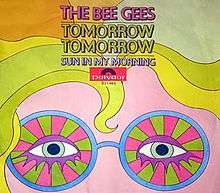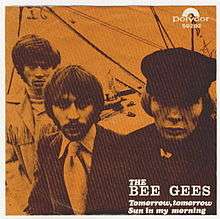Tomorrow Tomorrow (Bee Gees song)
| "Tomorrow Tomorrow" | |||||||||||||
|---|---|---|---|---|---|---|---|---|---|---|---|---|---|
 | |||||||||||||
| Single by Bee Gees | |||||||||||||
| B-side | "Sun In My Morning" | ||||||||||||
| Released | 1 June 1969 | ||||||||||||
| Format | Vinyl record 45RPM | ||||||||||||
| Recorded |
19–21 March 1969 IBC Studios, London | ||||||||||||
| Genre | Folk rock, pop rock, progressive rock | ||||||||||||
| Length | 4:05 | ||||||||||||
| Label |
Polydor 56381 (United Kingdom) Atco (United States/Canada) | ||||||||||||
| Writer(s) | Barry Gibb, Maurice Gibb | ||||||||||||
| Producer(s) | Robert Stigwood, Bee Gees | ||||||||||||
| Bee Gees singles chronology | |||||||||||||
| |||||||||||||
| |||||||||||||
"Tomorrow Tomorrow" is a song by the Bee Gees written by Barry and Maurice Gibb. The song was originally intended to be recorded by Joe Cocker.[1] It was the first Bee Gees single released after Robin Gibb had quit the group which was now down to a trio featuring Barry Gibb, Maurice Gibb, and drummer Colin Petersen.
Origin
Originally, the song was written for Joe Cocker, but the group ultimately released it themselves. Barry rushed the track through, but it never reached Joe, who was given 'Delta Lady' by his management instead".[2]
This song was recorded on 19 and 21 March 1969. Its B-side "Sun In My Morning" and the unreleased song "Ping Pong" were also recorded on March 19.[1]
Release
Released in the United States on 1 June 1969, the single charted only reached No. 54 on Billboard, but cracked the Top 40 on Cash Box, reaching No. 32. It achieved top ten placings in Brazil, New Zealand and some European countries, even topping the chart in Denmark, but in the brothers' native Britain peaked only at No. 23. The promotional video featuring, Barry, Maurice and Colin performing the song in a park is very rare. The band's manager, Robert Stigwood, made the decision to release the song as a single. Maurice later revealed, "We've got another one that we'll put straight out if it doesn't make it".[2] The song was felt by both brothers to be more suited to Joe Cocker's singing style than their own. Barry said "This was a mistake that Robert [Stigwood] very rarely made" while Maurice remarked, "I don't think it's us but I quite like it".[2]
Since neither song appeared on the next Bee Gees' album Cucumber Castle, no stereo mixes were produced until 1990 when they appear on the Bee Gees box set Tales from the Brothers Gibb. Barry can be heard counting the band in at the start of the stereo mix.
Personnel
- Barry Gibb — lead vocals, acoustic guitar
- Maurice Gibb — backing vocals, bass, piano, acoustic guitar
- Colin Petersen — drums
- Robert Stigwood — record producer
- Uncredited — orchestral arrangement, violins
Charts
Weekly charts
|
Year-end charts
|
References
- 1 2 Joe Brennan: Gibb Songs 1969
- 1 2 3 Hughes, Andrew. Bee Gees - Tales of the Brothers Gibb. Retrieved 23 January 2015.
- 1 2 3 4 5 6 7 8 9 10 "Songs Written by the Gibb Family on the International Charts - Part 1" (PDF). brothersgibb.org. Retrieved 24 January 2015.
- 1 2 "Bee Gees - Tomorrow Tomorrow". austriancharts.at. Retrieved 23 January 2015.
- 1 2 "Bee Gees - Tomorrow Tomorrow". ultratop.be. Retrieved 23 January 2015.
- ↑ "Bee Gees - Tomorrow Tomorrow". officialcharts.de. Retrieved 23 January 2015.
- 1 2 "Bee Gees - Tomorrow Tomorrow". Dutch Charts. Retrieved 23 January 2015.
- 1 2 "Bee Gees - Tomorrow Tomorrow". hitparade.ch. Retrieved 23 January 2015.
- ↑ "Bee Gees Chart History". Official Charts Company. Retrieved 24 January 2015.
- ↑ "Bee Gees Awards". Allmusic. Retrieved 24 January 2015.
- ↑ "Cash Box Top 100 Singles". Cashbox Magazine Archives. June 28, 1969. Retrieved 23 January 2015.
- ↑ "Cashbox Top 100 Singles". Cashbox Magazine. July 5, 1969. Retrieved 24 January 2015.
External links
- Promotional video of "Tomorrow Tomorrow"
